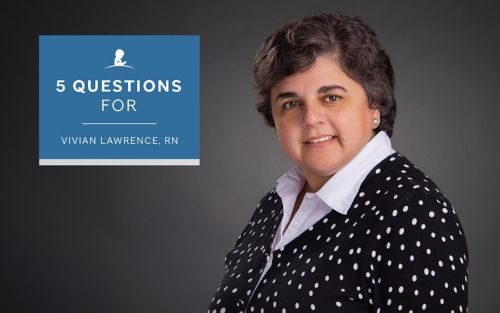St. Jude Family of Websites
Explore our cutting edge research, world-class patient care, career opportunities and more.
St. Jude Children's Research Hospital Home

- Fundraising
St. Jude Family of Websites
Explore our cutting edge research, world-class patient care, career opportunities and more.
St. Jude Children's Research Hospital Home

- Fundraising
5 Questions for Vivian Lawrence, RN

Clinical research associate, Vivian Lawrence, RN, reflects on a career path that led her to becoming a vital part of clinical research at St. Jude.
This question-and-answer series explores the motivations, inspirations and accomplishments of investigators at St. Jude. Vivian Lawrence, RN, is a senior clinical research associate in the Department of Pediatric Medicine at St. Jude.
1. What led you to pursue a career as a Clinical Research Associate-Registered Nurse (CRA-RN)?
I started my career as a nurse at the patients’ bedside. Early on, I was a staff nurse on the inpatient unit for Hematology/Oncology & Solid Tumor. From there, I moved from inpatient to outpatient care for the Solid Tumor & Brain Tumor clinic. Again, at the time, these units were combined, so I had the privilege of providing care to many of our patients at St. Jude.
Working in the outpatient clinic is where I learned more about clinical research and became increasingly curious. Research is in the name of St. Jude, so I was intrigued. I enjoyed bedside nursing very much, but I was interested in figuring out how to apply my nursing knowledge to other areas, and clinical research seemed like a good fit. The protocols I’d been implementing for years in patient care were largely based on findings from research, and I wanted to connect these two worlds. So, I decided to make the transition from clinical care to clinical research in the early 2000s. At the time, the approach to clinical research was an “all-hands-on-deck” approach, and I learned most of my skills on the job. I listened, I read and I absorbed. Our team went to conferences, such as the Society of Clinical Research Associates (SOCRA), and I later became a Certified Clinical Research Professional (CCRP), which is now a requirement set forth by the institution.
My first position in clinical research was in data management, which is a great place to start. I was going through patient charts, collecting data and helping to move the research forward in a data-driven way. After a few years, I moved into being a coordinator for Bone Marrow Transplantation, followed by being a Clinical Trial Monitor in the Clinical Trial Office and then to my current role of Clinical Research Associate-Registered Nurse (CRA-RN) in the Department of Pediatric Medicine.
Switching from a direct patient-care role to a role in clinical research was a big adjustment; however, the more I explored and learned about research, the more interesting it became. While I missed the direct patient care, I am grateful to see the development of clinical research at St. Jude and how it advances outcomes.
2. As a CRA-RN in the Department of Pediatric Medicine, what are your main responsibilities?
In my role as CRA-RN, ensuring the safety of our clinical trial participants is paramount. My main responsibility is to support the principal investigators of the Division of Anesthesiology in their research. We conduct retrospective studies, perform quality improvement studies and examine how to improve patient care. I perform data collection and abstraction, assist with protocol submissions to our institutional clinical research committees and oversee compliance of our projects with regulatory and institutional policies. The tasks and asks are varied, so it is a continuous learning experience for me.
Beyond this, I also function as a site coordinator to conduct the informed consent process when we approach patients to enroll them in a clinical trial that the Division of Anesthesiology is conducting. This allows me to leverage my patient care experience to help patients understand the clinical research at St. Jude and how they can participate.
3. What do you like most about your work as a CRA-RN?
The opportunity to interact with patients and families and help them navigate the complexity of clinical research with empathy is my greatest joy. When our patients and families are gracious enough to talk to me about how their participation in a study will advance our scientific and clinical knowledge, those are moments I do not take for granted. It is an honor to provide them with comprehensive support to help them better understand their decision to participate in a clinical trial or not.
4. What role does clinical research play in achieving the St. Jude mission?
Clinical research is fundamental to the pursuit of the St. Jude mission. This type of research helps develop new treatments and improve existing treatments while striving to minimize side effects. When we work collectively to conduct robust clinical research, we contribute to the St. Jude mission by improving long-term outcomes.
5. What is an accomplishment you are most proud of in your tenure as a CRA-RN at St. Jude?
I am most proud of my work in becoming a vital part of the ongoing research at St. Jude; whether by enrolling participants in clinical trials or abstracting and collecting data, I know my impact matters. I’m also currently finishing my PhD in health outcomes and policy research at the University of Tennessee Health Science Center (UTHSC). My study in this program has helped my current and future work at St. Jude immensely.
Most of all, my biggest sense of accomplishment comes every time a patient and their family allow me to sit with them to discuss participation in a clinical trial. It is the greatest privilege. They are experiencing unimaginable circumstances, and when they give me the chance to talk with them, to really listen to them, there’s no better feeling.







